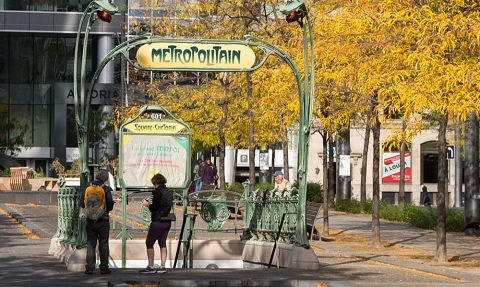Montreal Government Plans to Sell Cannabis in the Metro
Montreal, the second largest city in Canada and the country’s student and cultural capital, has long recognized the need for full cannabis legalization. As the date for national reform approaches, city officials have begun actively discussing plans to create a network of stores for distributing legal medical and recreational cannabis products. Officials are interested in placing these stores in locations that are easily accessible to the general public. For this reason, many politicians support the idea of opening legal cannabis outlets within the city’s metro stations.
The Issue of Cannabis Distribution in Quebec
Currently, Canadian authorities have approved the allocation of funds to a special government fund, which will be used to conduct formal scientific research on the properties of cannabis. Soon, both federal and provincial governments will begin regulating systems for distributing legal recreational and therapeutic cannabis.
Each Canadian province regulates the distribution of alcoholic beverages independently. For example, in Quebec, this is handled by the Société des alcools du Québec (SAQ), which operates government-funded liquor stores. With legalization, Quebec plans to establish a similar agency, the Société québécoise du cannabis (SQC), which will oversee the legal cannabis market. It is expected that during the first year of the national reform, 20 SQC-regulated stores will open in Quebec, with their number gradually increasing over time.
Buying Cannabis in Montreal
Of the planned 20 SQC stores, 4 are expected to open on the island of Montreal, in the lobbies of existing metro stations. According to city officials, these cannabis stores will be located at central metro stations, including a major stop under the Université du Québec. Notably, the university station, officially called “Berri UQAM,” is at the intersection of several metro lines in the heart of the city, serving over 13 million passengers annually. This high traffic makes it an ideal location for a cannabis store serving Montreal residents and commuters.
Additionally, a cannabis outlet is planned for the “Jean Talon” station, a key hub for the city’s northern metro lines, and at “Mercier-Hochelaga-Maisonneuve,” which serves as a transportation hub for the southern part of Montreal. Both stations are located near popular shopping streets—Saint-Hubert Street and Sherbrooke Street, respectively. The fourth store will likely be located at “Verdun” station or another major stop in the southwest part of the island, where downtown Montreal is situated.
Initially, stores were planned for the Ahuntsic, Anjou, LaSalle, and Marché stations along the central metro line, but officials ultimately deemed these locations too isolated for effective cannabis distribution.
Historical Connection Between the Metro and Cannabis Sales
Interestingly, Montreal’s drug dealers, including many underground cannabis sellers, have long favored the city’s metro stations as discreet locations for their business. For at least the past 30 years, city authorities have unsuccessfully tried to combat dealers in the metro: despite installing surveillance cameras in lobbies, platforms, and corridors, and increasing the number of metro security staff, drug dealers continue to operate at almost every station. This ongoing issue may be another reason why city officials are considering opening legal cannabis stores in the metro system.
Convenient Locations for Stores
As mentioned earlier, each Canadian province has the right to set its own rules and regulations for the cannabis market under the federal legalization bill proposed by the Trudeau administration. Currently, Quebec’s laws prohibit the sale of legal cannabis in shopping centers or in close proximity to them. As a result, Montreal, which is filled with such establishments, could have been left without any cannabis stores. Additionally, provincial laws ban cannabis outlets near public places like parks, museums, and educational institutions.
However, local authorities found a smart solution to this conflict with provincial law: the rules do not prohibit the city from opening cannabis stores in government-owned facilities, such as metro stations. By placing stores underground, city officials can bypass existing restrictions and locate stores in areas with a constant flow of potential customers, which could help the legal distribution system quickly achieve strong sales.
The First Step
The opening of four stores in Montreal’s metro is just the first step in developing the city’s cannabis retail network. According to the newspaper La Presse, at least four more similar stores will open in the metro by early 2019, with the total number continuing to grow. Alain Brunet, president of the agency regulating alcohol sales, hopes that the new cannabis control agency will become the first and largest government-run cannabis distribution network in Canada, expecting that within the next two years, the total number of stores in the city will exceed 150.
“It’s possible that Montreal will have more than 300 stores if public opinion and demand for legal cannabis allow it,” he said in an interview with local media.



